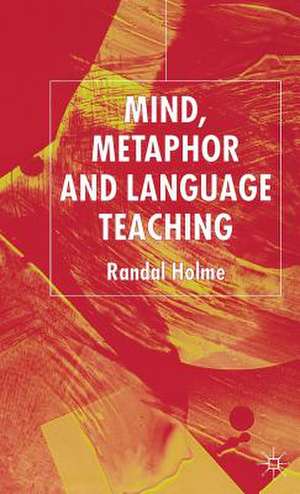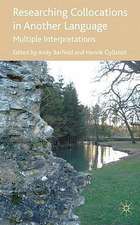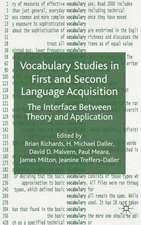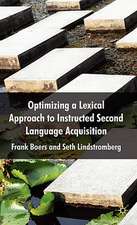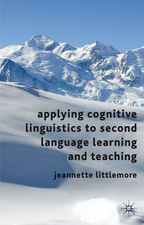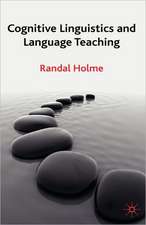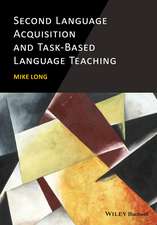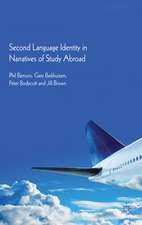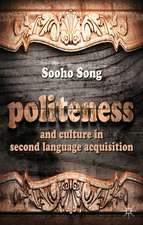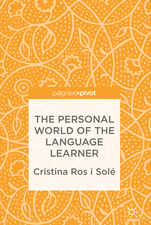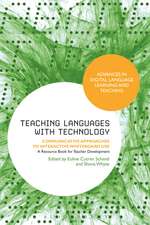Mind, Metaphor and Language Teaching
Autor R. Holmeen Limba Engleză Hardback – 16 dec 2003
| Toate formatele și edițiile | Preț | Express |
|---|---|---|
| Paperback (1) | 383.33 lei 6-8 săpt. | |
| Palgrave Macmillan UK – 16 dec 2003 | 383.33 lei 6-8 săpt. | |
| Hardback (1) | 385.25 lei 6-8 săpt. | |
| Palgrave Macmillan UK – 16 dec 2003 | 385.25 lei 6-8 săpt. |
Preț: 385.25 lei
Nou
Puncte Express: 578
Preț estimativ în valută:
73.73€ • 76.39$ • 61.53£
73.73€ • 76.39$ • 61.53£
Carte tipărită la comandă
Livrare economică 22 martie-05 aprilie
Preluare comenzi: 021 569.72.76
Specificații
ISBN-13: 9781403915856
ISBN-10: 1403915857
Pagini: 242
Ilustrații: XIV, 242 p.
Dimensiuni: 140 x 216 x 15 mm
Greutate: 0.35 kg
Ediția:2004
Editura: Palgrave Macmillan UK
Colecția Palgrave Macmillan
Locul publicării:London, United Kingdom
ISBN-10: 1403915857
Pagini: 242
Ilustrații: XIV, 242 p.
Dimensiuni: 140 x 216 x 15 mm
Greutate: 0.35 kg
Ediția:2004
Editura: Palgrave Macmillan UK
Colecția Palgrave Macmillan
Locul publicării:London, United Kingdom
Cuprins
List of Tables and Figures Acknowledgements Introduction PART 1: THE STUDY OF METAPHOR Early Perspectives The rehabilitation of metaphor The problem of knowing when something is a metaphor or not Metaphor and relevance theory The cognitive view of metaphor Conceptual metaphor: how metaphors share common themes How we shape abstract concepts with the metaphors we use to group them The lack of a clear distinction between the metaphorical and the literal Metaphors as transfers of meaning from one domain to another: mapping and blending How abstract meaning is conceptualised through metaphor and image schema Some of the conceptual metaphors that produce abstract language are culturally-specific and some are universal Grammar as developing from metaphor over time Conclusions PART 2: USING FIGURATIVE LANGUAGE The language of metaphor Stretching the domain What categories mean What teachers and students can do with their understanding of categories Achieving greater freedom with meaning: describing things as other than themselves Layering Metaphors looking for a meaning Conclusions PART 3: TEACHING THE LANGUAGE AND STRUCTURE OF METAPHOR Metaphor and parts of speech Metaphors that identify themselves: grammatical metaphor Elliptical metaphors Conclusion PART 4: ALLEGORY AND ANALOGY: TEACHING WITH EXTENDED METAPHORS Allegory Analogy Analogy, models and writing instruction Teaching with analogy: conclusions PART 5: TEACHING LEXIS THROUGH METAPHOR Bridging the gap between learning theory and language theory Using metaphor to teach abstract meaning Metaphor teaches students about language Using metaphor in the construction of discourse Expressing deductive and inductive arguments Cause-and-effect paths Conclusions PART 6: METAPHOR AND THE TEACHING OF GRAMMAR Phrasal verbs Tense and time Reference Expressing time Conclusions PART 7: THE METAPHOR OF LEARNING Linguistic theories of language acquisition There is no reliable way to distinguish acquired language knowledge from learntlanguage knowledge Generative theories of SLA The modular mind Cognivist and generative positions Student errors, CBT (cognitive blend theory) and the remodelling of second-language learning Towards a blend-structure model of second-language learning Cognitive blend theory and language learning How a CBT model can account for language learning A blend-structure model of language learning: understanding and correcting student errors Conclusions PART 8: CONCLUSIONS Cognitive not social relevance Cultural empathy Affective is effective A kinaesthetic pedagogy: understanding the physical basis of meaning A construction-based pedagogy: exploiting the spatial construction of meaning A participatory pedagogy Bibliography Index
Notă biografică
RANDAL HOLME is Director of the Language Centre at the School of Language and Linguistics, University of Durham, UK.
